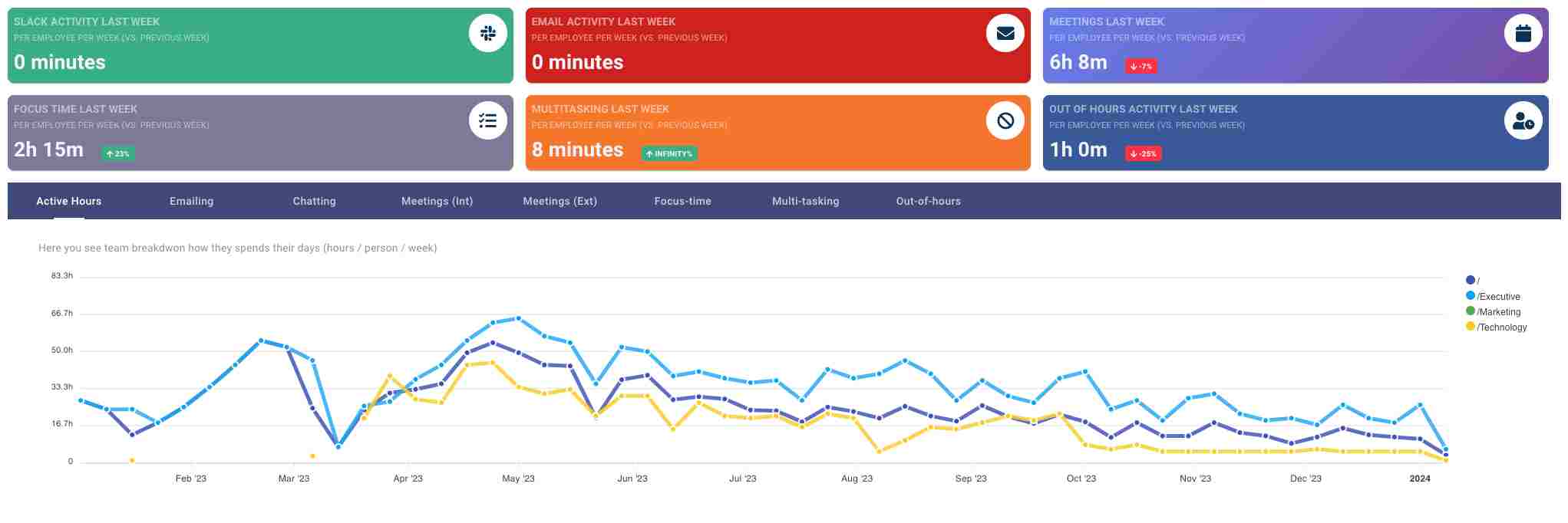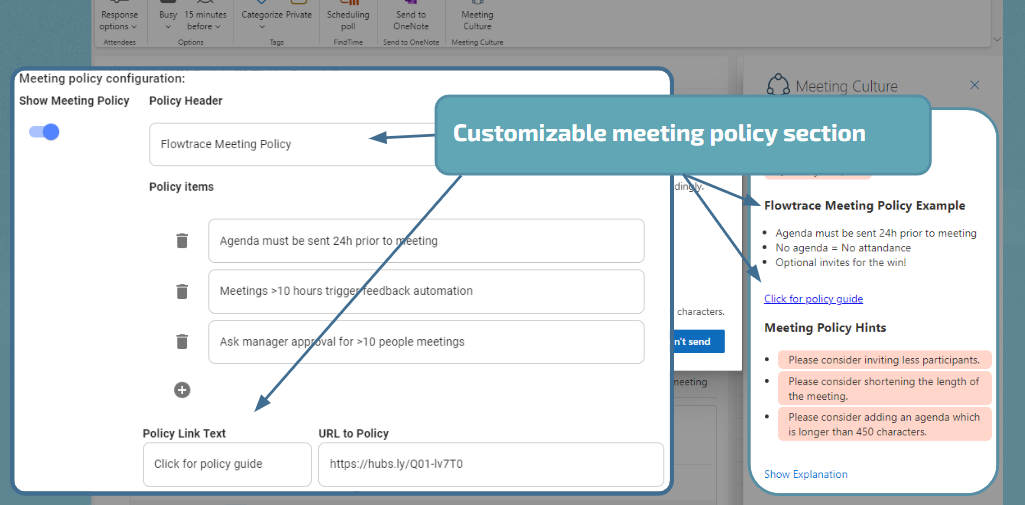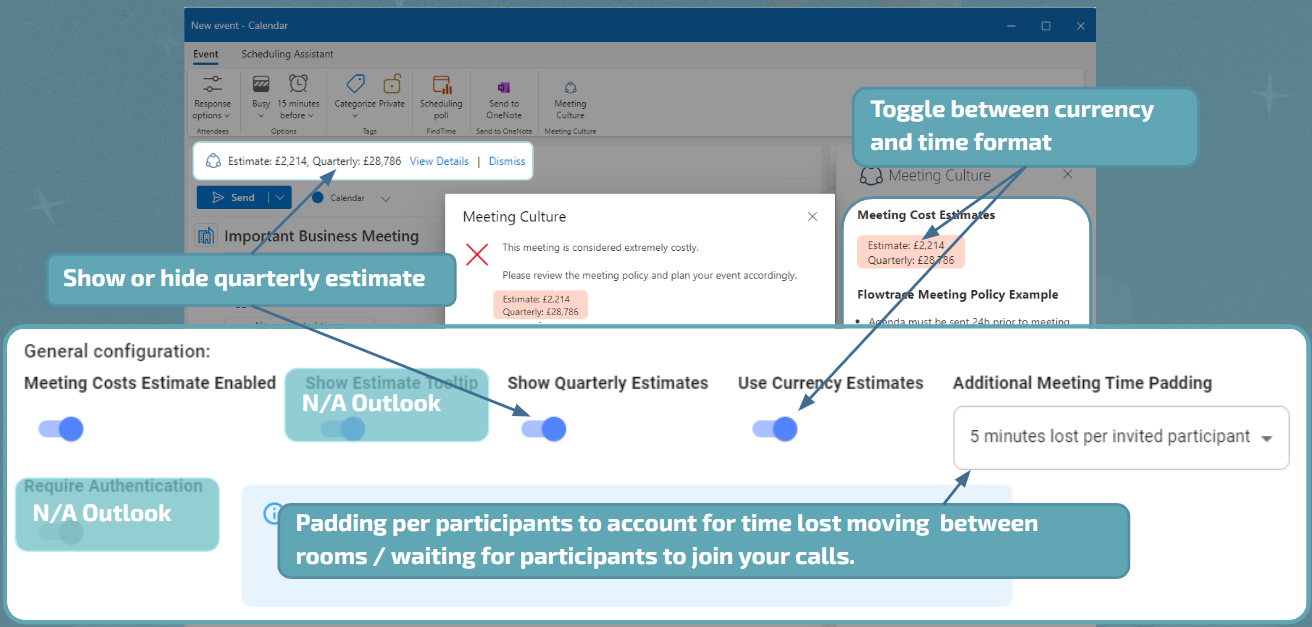How To Improve Leadership Meeting Time
Optimize leadership meeting time for maximum productivity and success. Learn how to balance meeting time with focused work and effective meeting...
Optimize team efficiency with effective meeting policies. Learn how meeting policy Outlook add-in streamlines scheduling and enhances productivity. Improve your meeting culture with Flowtrace.
Effective meetings are essential for optimizing team efficiency and productivity, and meeting policies play a significant role. Meetings are crucial for decision-making, collaboration, and alignment within organizations. However, without clear guidelines and structures in place, meetings can quickly become time-consuming affairs that drain resources and impede progress.
Meeting policies set the foundation for productive and purposeful meetings. They establish expectations regarding attendance, agenda clarity, time management, and follow-up actions, ensuring that meetings serve their intended purpose while minimizing disruptions and inefficiencies. By establishing roles, responsibilities, and protocols, these policies foster a culture of accountability and respect for everyone's time.
When it comes to streamlining meeting management and policy compliance, technology plays an important role. The Flowtrace Outlook add-in is designed specifically to empower managers to implement meeting policies seamlessly within the familiar Microsoft Outlook environment. This integration of technology brings unprecedented efficiency and control to the meeting scheduling process.
By leveraging the capabilities of the meeting policy Outlook add-in, managers can utilize customized meeting policy rules directly within Outlook, thereby preempting potential conflicts and ensuring adherence to established guidelines. This integration not only simplifies policy implementation but also enhances transparency and accountability across teams.
Meeting policies include a set of guidelines and items established by organizers to govern the planning, conduct, and follow-up of meetings. These policies serve the overarching purpose of optimizing organizational efficiency, enhancing collaboration, and maximizing the value derived from meeting engagements.
By defining expectations and standardizing procedures, meeting policies aim to ensure that meetings are conducted purposefully, with clear objectives, and that participants' time is utilized effectively.
Effective meeting policies are indispensable in team management and productivity enhancement. According to a study by Atlassian, the average employee spends approximately 31 hours per month in unproductive meetings, resulting in significant time and resource wastage.
Meeting policies provide a framework for streamlining meeting processes, reducing unnecessary meetings, and improving time management. They also contribute to fostering a culture of accountability and collaboration within teams, leading to enhanced productivity and achievement of organizational goals.
An effective meeting policy begins with establishing clear objectives for each meeting and creating a structured agenda that aligns with these objectives. This ensures that meetings remain focused and purpose-driven, minimizing the risk of tangential discussions and maximizing the use of participants' time.
Meeting policies should outline expectations regarding attendance and punctuality, emphasizing the importance of timely participation. By setting clear expectations, organizations can reduce disruptions caused by late arrivals and ensure that meetings start and end on schedule.

Guidelines on meeting duration and frequency help prevent over-scheduling and ensure that meetings are only convened when necessary. By establishing parameters for meeting duration and frequency, organizations can optimize time allocation and minimize unnecessary interruptions to workflow.
Meeting policies should define the roles and responsibilities of participants, clarifying expectations regarding contribution, engagement, and follow-up actions. This fosters accountability and ensures that all participants understand their role in achieving meeting objectives.
Effective meeting policies include provisions for documenting meeting proceedings and follow-up actions. This ensures accountability, facilitates continuity, and provides a reference point for future discussions and decision-making.
Incorporating these elements into a comprehensive meeting policy helps organizations optimize meeting effectiveness, enhance team collaboration, and drive productivity gains.
One of the primary challenges in meeting management is the issue of time wastage, often caused by overlapping meetings. According to a survey conducted by Doodle, a staggering 37% of respondents reported that they frequently attend meetings that are not productive.

This time wastage is furthered by overlapping meetings, where individuals find themselves double-booked or forced to choose between conflicting engagements. Not only does this result in inefficiencies and disruptions to workflow, but it also leads to frustration and burnout among employees.
Another significant challenge in meeting management is the lack of accountability and engagement among participants. Research conducted by Harvard Business Review reveals that 71% of senior managers view unproductive meetings as one of the biggest blockers to their team's success.
Without clear expectations and mechanisms for accountability, meetings can devolve into passive, unproductive minutes, where participants disengage or fail to contribute meaningfully. This lack of accountability not only undermines meeting effectiveness but also damages trust and cohesion within teams.
The challenges in meeting management have a detrimental impact on team morale and productivity. A study by Bain & Company found that senior executives spend an average of two days per week in meetings, with only 15% rating them as productive.
This excessive meeting burden not only drains valuable time and resources but also contributes to heightened stress levels and decreased job satisfaction among employees. Furthermore, unproductive meetings can hinder progress on important initiatives, leading to missed deadlines and suboptimal outcomes.

Addressing these challenges requires effort to implement effective meeting policies and leverage technology solutions that streamline meeting processes, enhance accountability, and promote meaningful engagement. By doing so, organizations can mitigate the negative impact of meeting mismanagement and unlock the full potential of their teams.
The Outlook add-in is a solution for managers seeking to enhance meeting policy implementation and streamline meeting management processes. Seamlessly integrated with Microsoft Outlook, it allows for customized meeting policies directly within their familiar email and calendar interface.

.png?width=680&height=382&name=Outlook%20Add%20In%20Store%20Images%20-%203%20(1).png)



Effective meeting policy management is essential for organizations striving to maximize the value of their meetings and enhance overall productivity. By proactively defining policy parameters, implementing clear guidelines, and enforcing rules consistently, organizations can minimize time wastage, foster accountability, and promote a culture of purposeful collaboration. Improve your meeting culture today with Flowtrace.
Optimize leadership meeting time for maximum productivity and success. Learn how to balance meeting time with focused work and effective meeting...
Implementing meeting policies in Google Calendar can streamline efficiency and productivity in the workplace. Discover the benefits of integrating...
Enhance productivity and decision-making with strategic meeting management. Learn key components, best practices, and solutions for effective...